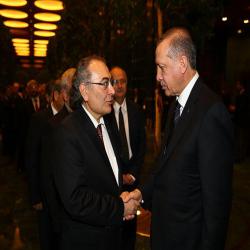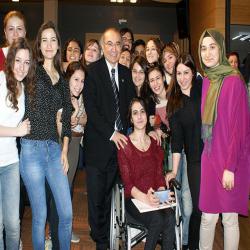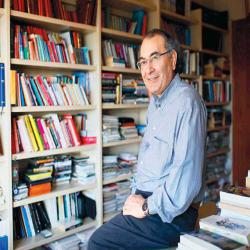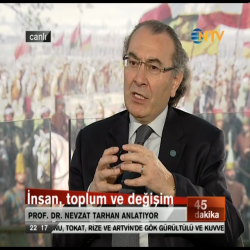■ On the Monday we lost 10 more soldiers to the PKK terror, during rush- hour traffic ill the business district of Istanbul, when a male driver began to honk the hom non-stop in an attempt to "protest" the congested lane he was stuck in. a wave of anger probably stronger than Iris took over me because he was causing more stress without being considerate of others. He was a prisoner of Iris anger at the expense of the sanity of others. However, we all know that this frantic driver is not alone or an exception. We are becoming an increasingly angry society full of people who are not able to control this verv natural instinct that we should have learned to tame from an early age.
Although a certain amount of anger is necessary for our survival because it is an adaptive response to threats and attacks, when uncontrolled it can lead to a society that looks similar to the one we live in: quarrels in Istanbul's jungle-like traffic, increasing levels of domestic violence towards women, people who cannot tolerate each other in shopping or transportation lines, increasing incidents of tortured children, women murdered because they asked for a divorce and so on. A recent World Health Organization (WHO) report supports the fact that we are more angry because it found that Turkish youth ranks fourth out of 34 nationalities among the most angry.
Blaming it on "external factors" such as stress, terror, uncertainty and the instability surrounding Turkey could -- rightfully - be justified to a certain extent. According to a recent survey by Regus released in September, 59 percent of the people sav their level of stress at work has increased in the past year. However, the type of incidents caused by anger seems personal, not collective. Sociologist Professor
Yasin Aktav confirms that the Turkish people's level of anger is prettv high compared to that of other societies, while arguing that external factors have a limited impact on our anger. "Our anger threshold is low." Aktav says, linking it to the way we are raised in Turkey. Unfortunately, anyone who drives in Turkey could provide evidence for Aktav's analysis, given the high probability of witnessing road rage.
It is not to suggest that anger should be ignored completely On the contrary according to scientists, unexpressed anger can create other problems. It can lead to passive-aggressive behavior or a personality that seems perpetually cynical and hostile. As a result, it matters that people express their anger constructively to avoid relationship problems. People who seem constantly grumpy might actually be the ones who are unable to express their anger or are not even aware of it. Counselor Elyan Aksav defines anger as a form of energy as she says that it is a type of manifestation for people who have not lived up to their potential, which is prettv common in our society.
Psychiatrist Professor Nevzat Tarhan
Psychiatrist Professor Nevzat Tarhan, author of "Masnavi Therapy," states that the rise in "social narcissism" is the leading cause of increasing anger in Turkey. "In a society where egos are boosted, cultural narcissism is inevitable" as everyone becomes more self- centered and intolerant. Interestingly Tarhan, who recommends remedies for psychological issues based on Rumi's "Masnavi" written in the 13th century, says the problems we encounter today are not much different from the time Rumi wrote his timeless advice. "Human beings are the same and today we also suffer from the degeneration of values as in Rumi's time." According to Tarhan, modern life only accelerated the transmission of evil, which is why the media especially have a responsibility
for transmitting the good at an equal pace.
Suggesting education as a solution to a problem in Turkey has become too banal because it has been listed as the number one solution to all problems for decades if not for centuries. However education still seems to be the first solution people can think of. Almost in consensus, experts talk about the necessity of providing the right kind of education to teach how to manage anger. Sociologist Aktay, referring to the-too ideological nature of our education system savs that "we do not have a well organized education philosophy that instills in people the basic values."
Ironically, although Turkey is predominantly Muslim, in terms of the moral values, it is difficult to argue that people live in accordance with the Muslim teachings of putting others first and forgiving others rather than being quick to anger. Aktav says that "education requires focusing on micro issues as well, such as relations among people."
As a professor specializing in religious psvchologv, Recep Yaparel of Dokuz Evltil University agrees that people have not internalized certain virtues such as respecting the rights of others and managing greed, despite the fact they seem to have a religious knowledge of them. "Modern life sets high goals and expectations for people, often beyond their reach, which leads to the frustration and anger," adds Yaparel, while stating that Islam does not recommend going after too ambitious and long-term expectations. Islam recommends moderation in all issues.
Violence against women is probably the most vivid and alarming manifestation of anger in Turkey. Almost every dav a woman is attacked. Usually, it is women who want a divorce who are targeted by their husbands. For experts, they are not targets of violence because they are women, but because they are weaker. "There is violence because we tend to use our power without any control," says Aktay. "It is not only tire husband's violence towards the wife, but the mother-in-law's to the daughters-in-law. for instance."
Therapist Elyan Aksov agrees that men tend to take their anger out on women since they are weaker. However, she also provides examples of strong independent women who are victims of domestic violence, stating that "a man unable to please Iris wife might resort to violence." She also says the increasing demand for "having it all" in modern life triggers violence, while suggesting people learn to give and share. Confirming this, Yaparel says that "people, particularly men, whose self-esteem is eroded as a result the higher expectations of the modern world resort to violence."
Referring to a verse in the Holv Quran recommending people be kind to their closest family members beginning with one's parents, Yaparel savs Islam takes anger management seriously because anger distorts relationships between people and leads to strong inner conflicts.
There is no doubt about the diagnosis of the problem. Turkey is almost hijacked by rage. But what about tire remedy? Tarhan recommends using the firefighter model in which you first put out the fire and then search for tire reason. "If vou use your broken arm it hurts more." he says, while suggesting that people use a three- step formula to fight anger: stop, think and act.
Successful anger management begins at an earlv age within tire family and is nurtured bv education. However, as always, leading bv example is a much more effective tool than preaching about solutions. It is not to suggest that addressing the problem is futile, but clearly it is unlikely to change anything in the short tenn. Yet, we can still save the next generation before they join an army of walking time bombs.
Okunma : 2541










